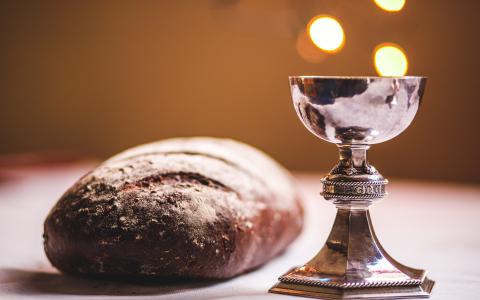
Welcoming Children to the Lord's Supper Toolkit
From Thrive
Emmanuel Christian Reformed Church, Sauk Village, IL
Children at the Table, One Congregation’s Journey
Written by Tim Koster, pastor
February 2015
It was first put on our radar when Synod approved inviting children to the table a few years back. We initially, rather casually, decided as elders to invite children to make profession of faith as they felt the desire irrespective of age knowing that many of our junior high students would fall into that category. It circled around again when lower elementary students began to ask their parents questions about participating and, with an awareness of Synod’s decisions, those parents approached the council. Wanting to process the discussion well with open dialogue while avoiding division, we started congregational conversation in a series of planned events.
We have had 4 congregational events. For the first one we handed out copies of the Calvin Theological Seminary’s Forum on the topic which presented a variety of perspectives. Then we devoted an evening service to a guided discussion on four questions:
This discussion offered a nice introduction, but it was difficult to stay on track. Few people completed in advance the extensive reading required by the Forum article and the discussions kept jumping over the first question and getting stuck on the second question. Our congregation tends to default to the assumption that a profession of faith is required. The default questions have been: “What should that profession look like?” and “Are children capable of it?”
Our second discussion also took place on a Sunday evening. In preparation for it, our elders prepared a much shorter document summarizing a “best argument” for inviting children to the table. We stressed that this was not a proposed position, but a way of compelling ourselves to step out of our traditions to another point of view. Then we invited the congregation to come and respond to the article. Did it make sense? Where was it off base? What questions did it raise?
For our third discussion, we invited Robert and Laura Keeley to present the denomination’s position. We hosted their discussion along with a potluck after the morning service. A few months later, we also arranged for Cornelis Venema from MidAmerica Reformed Seminary, who presented a different view. We again had a potluck/conversation format but instead of a presentation we set it up as an interview.
Most recently we are sensing a little congregational burnout on the issue. There is not a great deal more to learn. The congregation is trusting the elders to make the decision. We are currently soliciting letters from those in the congregation who want a final word of input before the elders draft a policy to guide us in the future. The congregation is largely on the same page when it comes to seeing children come to the table at an earlier age. We still have diversity as to whether that invitation to the table comes on the basis of their place in the covenant or their expression of faith, but there does seem to be respect across that divide giving the elders freedom to lead.